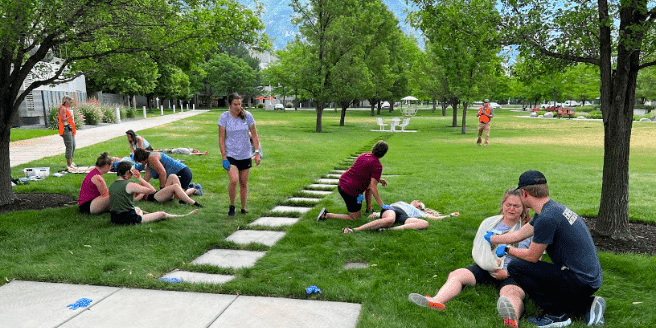Cogent Steps, in conjunction with Rocky Mountain University, recently hosted our Emergency Response for the Athlete course in Utah. In addition to the course, students were also offered the opportunity to participate in a special one-day mass casualty course.
The goal…
The goal of these events were to challenge the readiness and actions of sports medicine and school administrators for a mass casualty event at their location. Simulating a bleacher collapse in the heat students triaged, treated and simulated transport of various levels of injured students. Discussions included challenges with limited resources, communication and chaos.
The result…
Attendees benefited by applying learned skills to a stressful training environment. Emergency medicine can be very stressful and training to as close as the real thing is worth its weight in gold.
“I believe the students learned how important it is to make critical decisions and apply interventions in a timely manner. If decisions aren’t made quickly, the outcomes of saving life are decreased,” said Cogent Steps instructor Joel Bannister.
Megan Mitchell, Cogent Steps instructor, goes into detail on why hosting courses like this is so important: “The sporting world is not immune from the risk for mass casualty or multiple casualty events from natural disasters, human disasters or terrorism. If it happens in our communities, everyone should have the training and skills to engage in effective and safe response. This starts with learning and training with the use of the National Incident Management System and the implementation of the Incident Command System. This allows responders to all speak and practice with common language from the individual level up through the national responder level. Physical therapists and athletic trainers have the skills and the training to provide immediate life saving care for acute catastrophic injuries.
The MCI training event at Rocky Mountain University was a chance to apply those skills in a multiple casualty event with controlled learning that allowed participants to practice functioning within incident command and engage as a part of the response process. Events such as the Boston Marathon Bombing, the collapse of the Dallas Cowboys practice facility and stadium collapses from structural failure are a few examples where the rehabilitation staff and training teams may be among the first responders on site and would initiate the coordination of a response, but learning the process on paper or video doesn’t afford the same learning as in-person training drills.
I believe that the lessons from the in-person training will leave a greater impact on the students than any training video ever could. You can’t develop motor memory in chaos if you’ve never stressed yourself to learn in similar chaos when adrenaline is elevated and the fight or flight response tries to take over.
Rehabilitation services engaging in MCI or disaster response are under-utilized within the United States and especially outside of sporting events but are widely utilized in other countries as embedded members of large scale response operations. If we have the skills, the training and the ability to add response capacity then we need to show up and show our traditional first responders that we can and should be included.”
Are you interested in either hosting or attending a Cogent Steps course? Learn more about hosting a course or register for our Emergency Response for the Athlete course, our Emergency Response for the Athlete Recertification course, or one of our online offerings!



I find it interesting when you said that there would be an incident command board system that people can learn to be able to speak the language of those at the national responder level. I can imagine how that can make it easier for the responders to plan their course of action when other people can tell them exactly what they need to hear about the emergency. And it might actually save as many lives as possible when that happens.